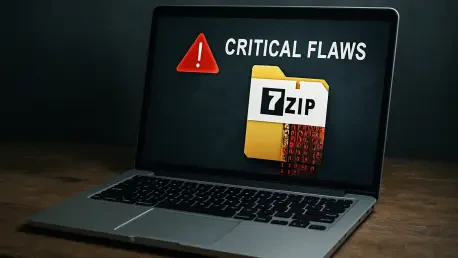In an era where digital security is paramount, a startling revelation about a widely trusted tool has sent shockwaves through the tech community, exposing millions of users to potential cyber threats that could compromise their systems. 7-Zip, the popular open-source file archiver used by individuals and organizations alike for compressing and decompressing files, has been found to harbor serious vulnerabilities that could allow malicious actors to execute arbitrary code on affected systems. Identified as CVE-2025-11001 and CVE-2025-11002, these high-severity flaws impact all versions prior to the latest release, version 25.00. The risks associated with these issues are profound, potentially leading to system compromise, data breaches, or the deployment of malware. Given the software’s extensive adoption across diverse environments, from personal laptops to enterprise servers, the urgency to address this threat cannot be overstated. This situation serves as a stark reminder of the hidden dangers lurking in everyday tools and the importance of staying vigilant in the face of evolving cyber risks.
Unveiling the Technical Weaknesses
At the heart of these vulnerabilities lies a critical flaw in how 7-Zip handles symbolic links within ZIP archives, creating an opportunity for exploitation through carefully crafted malicious files. When a user decompresses such a file using an outdated version of the software, the improper processing of symbolic links can trigger a directory traversal attack. This allows attackers to place harmful files outside the intended extraction directory, potentially in sensitive system areas where they can wreak havoc. Although the attack requires user interaction—meaning the victim must open the malicious archive—it can be delivered remotely through various channels, such as email attachments or deceptive downloads. Both flaws have been assigned a CVSS 3.0 score of 7.0, marking them as high-severity threats due to their potential impact on confidentiality, integrity, and availability. The ability to execute code with the same privileges as the user or service running 7-Zip underscores the gravity of this issue for both individual and organizational security.
Addressing the Threat and Moving Forward
Prompt action emerged as the key response to mitigate the risks posed by these vulnerabilities, with the release of 7-Zip version 25.00 offering a critical patch to resolve the issues. The flaws were responsibly disclosed to the vendor earlier this year, followed by a public advisory to ensure widespread awareness and encourage immediate updates. Security researcher Ryota Shiga of GMO Flatt Security Inc., in collaboration with takumi-san.ai, deserves recognition for identifying these threats, highlighting the importance of community-driven efforts in safeguarding software ecosystems. Beyond individual updates, this incident pointed to a broader trend of recurring vulnerabilities in file compression tools, particularly around symbolic link handling, raising questions about the need for enhanced security practices in developing widely used utilities. Looking back, the availability of a patch and the necessity of user interaction somewhat tempered the immediacy of the danger, yet the significant user base of 7-Zip meant that unpatched systems remained at substantial risk, emphasizing the critical need for timely software maintenance.









